A New Mayor is Good Business for Bed-Stuy’s Mom-&-Pops
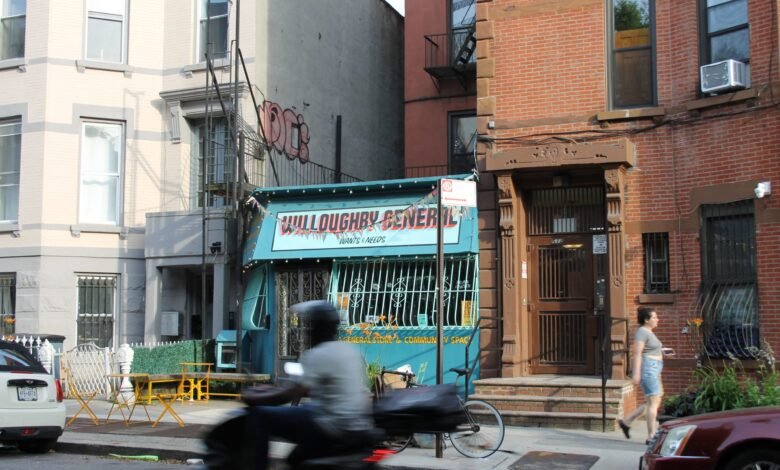

The south-bound B43 bus takes its riders down Tompkins Avenue, a bustling strip in Bed-Stuy, New York. Out the window, riders of the B43 will see all manner of businesses flash by—restaurants, cafes, bars, gift shops, bookstores, clothing boutiques, apothecaries, and even a juice bar specializing in homemade ginger beer. With the New York City mayor’s race looming, and conversations about affordability on the lips of politicians and pundits, I set off on foot down Tompkins Avenue—with a few deviations onto side streets and neighboring avenues—a few days ahead of a historic and unexpected mayoral primary election result to hear from small business owners about their biggest concerns living and running a business in New York City.

Deb Shields, owner of Confessions Bar (Photo by Georgie McKeon)
“I think the next mayor needs to be allocating more funds toward mental health services. Because you could lose your mind in this city,” says Deb Shields, owner of Confessions Bar on Marcus Garvey Boulevard. Shields has lived her entire life in the Bed-Stuy brownstone her parents bought 67 years ago, and grew up seeing legends like The Supremes perform at Throop Theater—originally called, but unassociated with, the Apollo Theater—at Fulton and Throop Avenue, which is now the site of a McDonald’s. Shields is the President of the Monroe Block Association, a former judicial delegate, and the owner of several properties in the neighborhood. She believes that the daily aggravations that New Yorkers endure are taking a toll on their mental health, and that hen-pecking regulations and compliance penalties are driving business owners out of the city. Earlier this year, the city fined Shields $6,250 for hanging a vinyl banner over the awning of her storefront and ordered her to hire a separate entity to take it down, which cost an additional $2,800.
“They give us the hardest time of anyone. Every little thing. Peck, peck, peck. It makes you want to leave the city. It makes you want to shut the business down, or sell it and walk away. Nobody wants to be constantly pecked at for just trying to provide a service, to do something honest,” Shields said.
Salvotore Gandolfo, co-owner of Macosa Trattoria on Tompkins Avenue, shares Shields’ frustration with compliance penalties and the associated costs of inspections. “We’re all in agreement that safety needs to be a priority, and that there needs to be oversight and regulators. But the Department of Health and Mental Hygiene exists more as a system of fines and bureaucracy and summons, that creates less incentive to be a clean restaurant and more of an incentive to be somebody who could afford to pay for a lawyer, pay all the fines down, and wipe their hands,” Gandolfo told me.
Since his restaurant opened in 2021, Gandolfo claims the cost of passing inspection has increased with new requirements and new penalties. For example, as of July 2023, the FDNY now requires all inspections, tests, and maintenance of commercial kitchen fire suppression systems be conducted by technicians with the “S-17” certification. The going rate for technicians with this certification is reported to be between $100 and $300 per hour in New York City, with the cost of one annual inspection falling anywhere between $1,000 and $8,000, depending on the size of the system. Failure to comply can result in fines up to $5,000.
Efforts have been made by the city to reduce the regulatory burdens on small businesses. Mayor Adams’ “Small Business Forward 2.0” initiative, effective this May, reduced some existing fines, lessened penalties for certain first-time infractions, and introduced a two-step system where restaurants receive advance notice before health inspections.
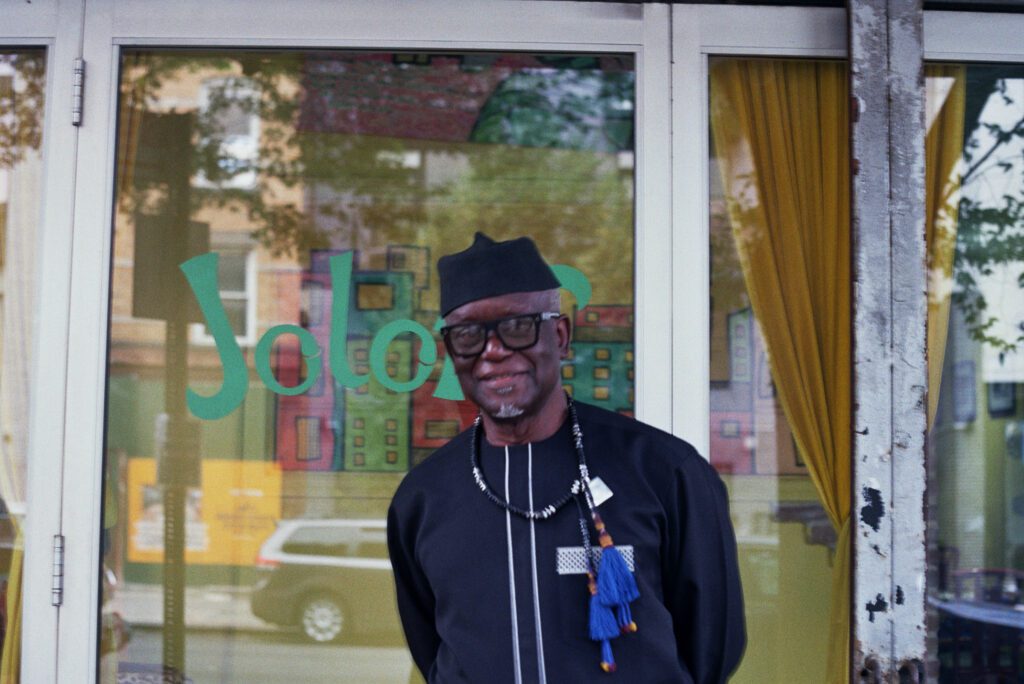
Papa K. Diagne, owner of Joloff (Photo by Georgie McKeon)
Even with these reductions, fees from city departments are just more burdensome expenditures that small businesses must contend with, while inflation and tariffs drive up the cost of goods and services. “Everything has gone up. The gas bill is high, the electrical bill is high. Groceries, fish, and vegetables cost much more than they used to. And the customer coming to you can only see that the price on the menu changed—they don’t know how much everything went up and that you are trying to reflect that,” said Papa K. Diagne, whose restaurant Joloff on Bedford Avenue is celebrating sixty years in business this month.

Rocco Jr, owner of Rocco’s Pizza (Photo by Georgie McKeon)
Customers’ spending habits have shifted, too. Rocco’s Pizza has been in business for more than sixty years in Bed-Stuy, and Rocco Jr. has been running the shop since the 1990s. “Back in the old days, people would come in a pizza shop 100 times a day, for a slice, for a water, for a napkin, whatever. But after Covid, the vibe has changed. With rents going up, people don’t eat out the way they used to,” he explained.
Nearly everyone I spoke to cites the rising cost of rent as one of the most important issues facing their businesses and a top concern in this election. “We already operate on such a razor-thin margin,” said Salvatore Gandolfo. “The people that live here are less able to dine out here because the price of rent has gone up so considerably.” Many of the businesses on Tompkins are approaching the end of their leases, or their leases will expire in a few years. “If things continue the way they are, I don’t know if anyone is going to be able to resign their lease. It’s not sustainable,” Gandolfo lamented.

(Photo by Georgie McKeon)
In 2018, the owners of Willoughby General, a storefront operating since the 1940s, were looking to close their shop and pass it to someone who would maintain its community focus. Lauren Cawdrey, a neighbor and patron of the shop, jumped in. She had never run a business before and funded its opening with a few credit cards.
“I had this romantic idea to jump in and sustain this business, but I was only able to do it because the rent was really affordable at the time,” Cawdrey explained. “It’s so frustrating to see empty storefronts where there were once great businesses. We really need to find a way to work with these commercial landlords to regulate rent increases because it’s just becoming unattainable for people to make that kind of leap like I did.” Cawdrey doubts that she would have been able to sustain that kind of financial risk if she had made it today, with today’s rent prices.
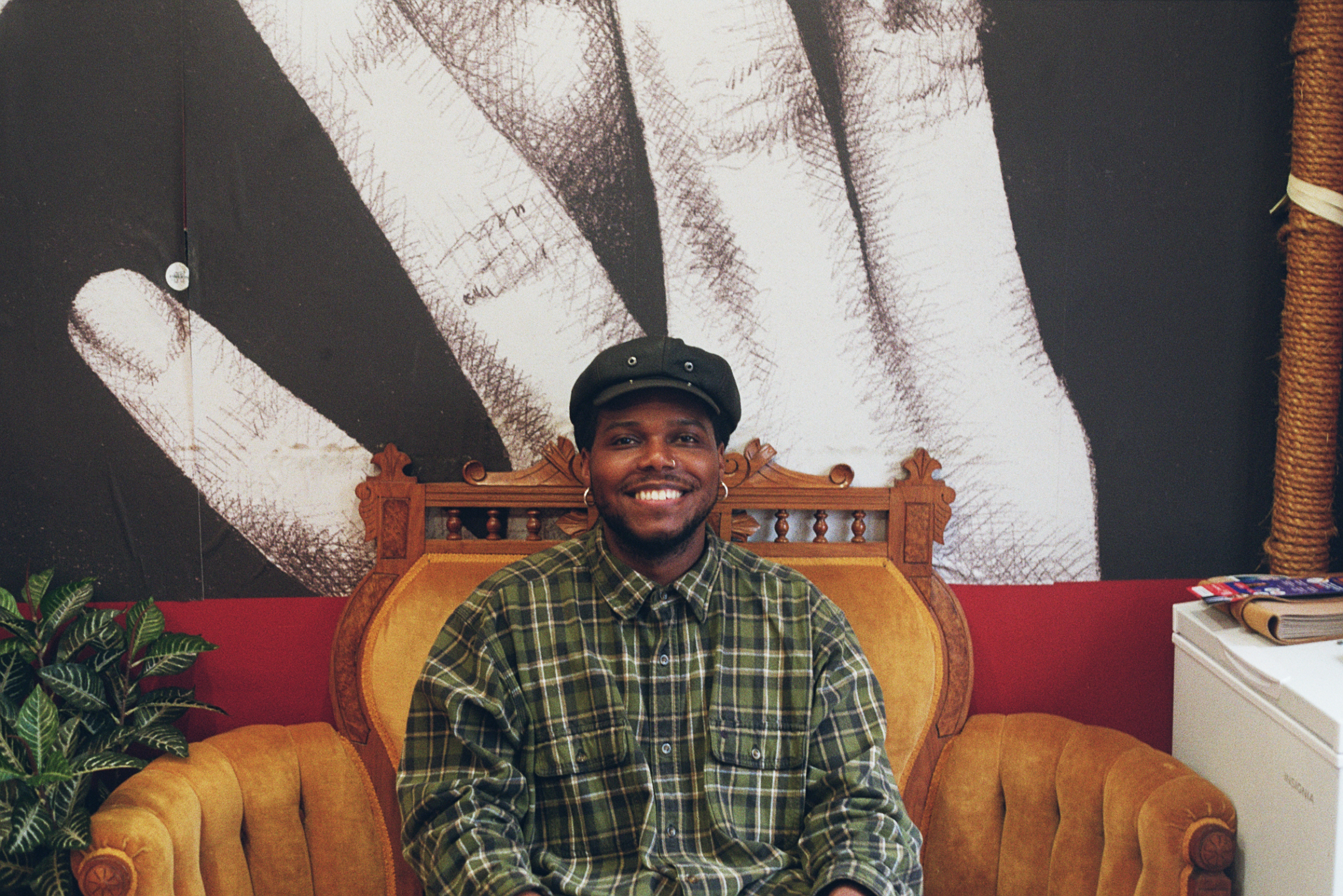
Harvey Leon, co-owner of Byas & Leon (Photo by Georgie McKeon)
Harvey Leon co-owns vintage clothing store Byas & Leon on Tompkins Ave. In 2021, after months of being closed due to COVID lockdown restrictions, the store’s two-year lease expired, and rent was raised by $700. After some negotiations, Leon signed the lease, with the concession that the new lease would be for five years instead of two. Byas & Leon is celebrating six years in business this month, but Leon is doubtful about his future on the block.
“It’s very possible that we won’t be able to stay on Tompkins Ave if our landlord raises the rent again. People in the neighborhood might have more money, but that doesn’t automatically increase my revenue. There are a lot of people who move to Bed-Stuy, but they hang out in Greenpoint. They spend money in Williamsburg. If you move anywhere, you should be investing yourself and getting to know the neighborhood. You moved there for the vibes and what are the vibes? They were created by the small businesses and people already there,” Leon said.
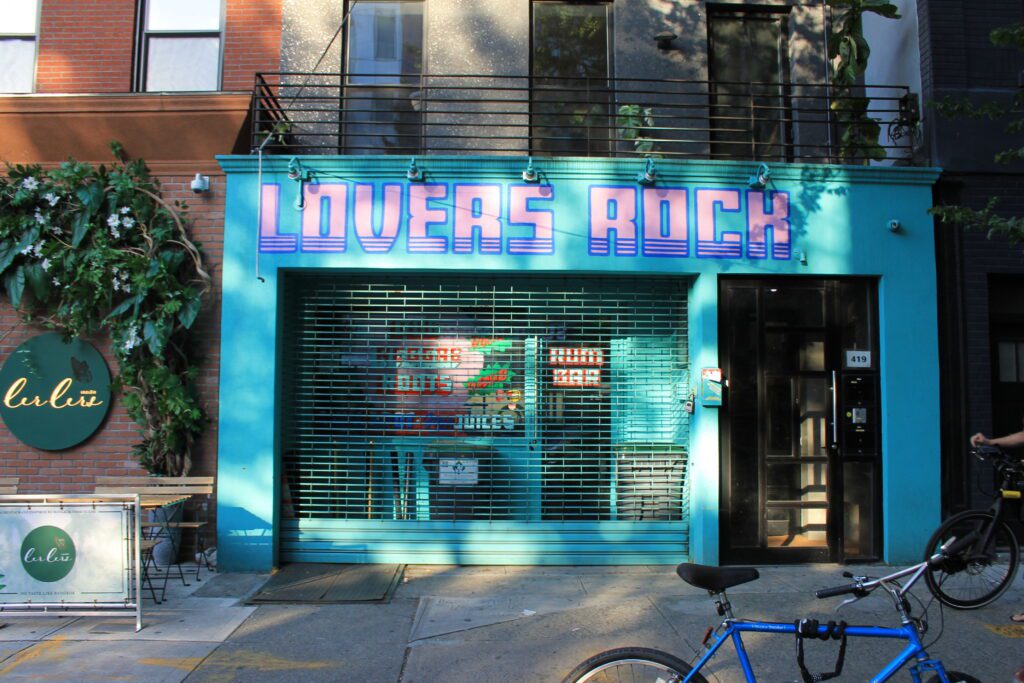
(Photo by Georgie McKeon)
As they watch long-time residents and businesses struggle to afford the rising cost of rent, gentrification is top of mind for many of the people I spoke to. Deb Shields is worried about the longevity of Black-owned businesses in the neighborhood. “We are trying to hold onto our businesses and keep our foothold in the district. We’ve been here for 50 years, 60 years, 70 years in some cases,” pointing to the recent closures of reggae and rum bar Lovers Rock and Bed-Vyne Brew. “That really scares me.” Harvey Leon noted. “Bed-Stuy is a beautiful, thriving community. Naturally, when you create a cool vibe, what happens? People from around the world are gonna want to move here.”
As we spoke, Leon spotted a tourist wheeling a suitcase down the street. “I’m cool with that. We want the world to see us. But now we need to have laws in place that prevent the original residents from getting pushed out.”
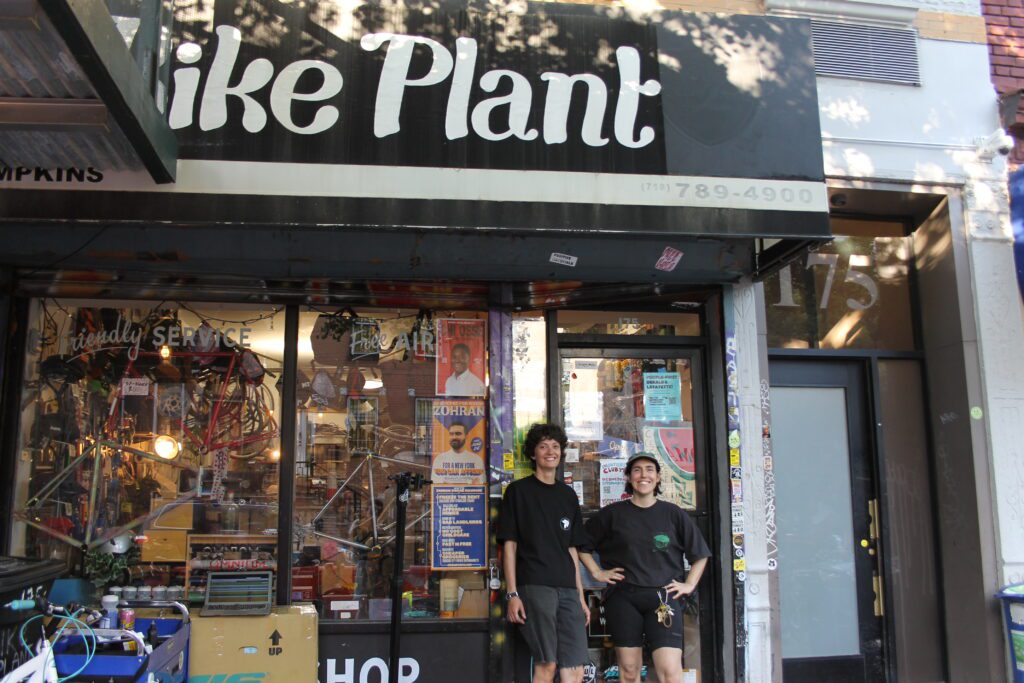
Robin Graven-Milne, owner of Bike Plant (Photo by Georgie McKeon)
“Commercial rent protections are a no-brainer for keeping the city interesting and vibrant,” says Robin Graven-Milne, the owner of Bike Plant on Tompkins Ave. Owning a bike shop, Milne encounters a wild breadth of people daily, with customers bringing in bikes that range between $50 and $10,000. “The reason why New York City is so vibrant is because it has all these different people bumping against each other. Any homogeneity in a community leads to less opportunities for people to be challenged and to learn and grow as individuals. The potential loss of that is something we all need to be cognizant of,” she said.
Out of the fourteen people who spoke to me for this article, one person said that they were voting for Andrew Cuomo for mayor, and ten people said that they were voting for Zohran Mamdani. The others chose not to disclose their vote. Collectively, those supporting Mamdani are drawn to his principles, his vision for an affordable New York, and his desire to improve the daily lives of New Yorkers.
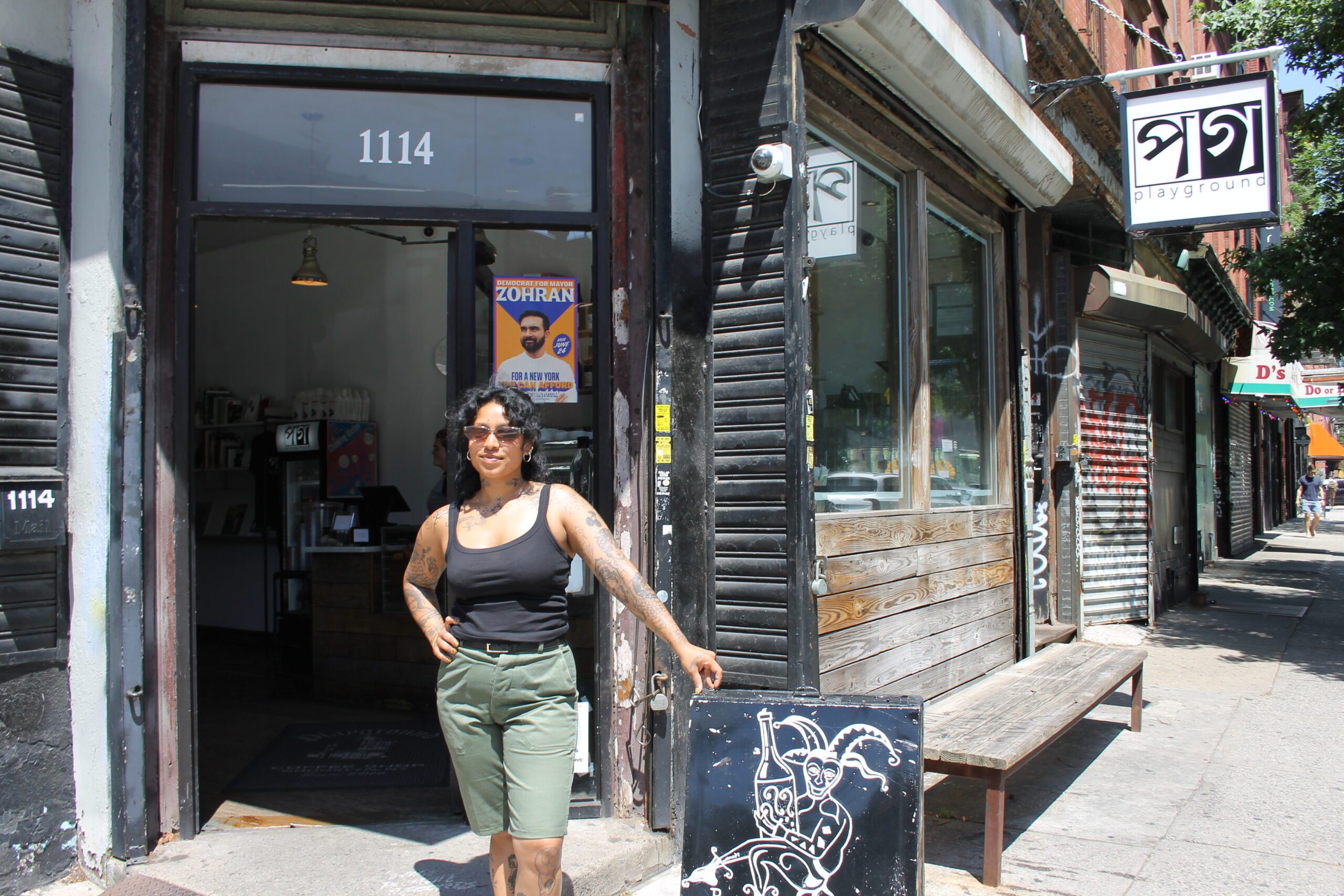
Zenat Begum, owner of Playground (Photo by Georgie McKeon)
Zenat Begum, owner of Playground, the coffee shop and wine bar on Bedford Avenue, is impressed by the canvassing efforts and the grassroots spirit of the Mamdani campaign. “I saw him walking across my street the other day and that made me feel so good—that someone literally touched the ground that I walk on every day and now has seen what I see, that this person seems to really want to connect with New Yorkers.” For Begum, a lifelong resident of Bed-Stuy, this election is the first time in a long time that she’s had hope for a politician. “As a Muslim South Asian living in New York with immigrant parents, I’ve never felt safe with the people who represent us. I’ve always been skeptical and I’m still not putting all my eggs in one basket. But I’m hopeful that this person is different and is looking out for people who are vulnerable and sensitive to all the changes happening in this city. This feels like the first time that there is space to listen to one another.”
Whoever they are voting for, everyone agreed that we need a mayor who will protect New Yorkers and the city’s independent spirit— as defined by everything from its small businesses to its signature Brooklyn brownstones to its status as a sanctuary city to freedom from federal overreach.
“I think a lot of people have felt helpless for a really long time. It’s hard to ask people to give a shit, right?” asked Salvatore Gandolfo. “Actually, I think that’s something we can vote for. If people see someone fighting for them, their spirits will be lifted. They’ll want to fight for themselves.”
The post A New Mayor is Good Business for Bed-Stuy’s Mom-&-Pops appeared first on BKMAG.





